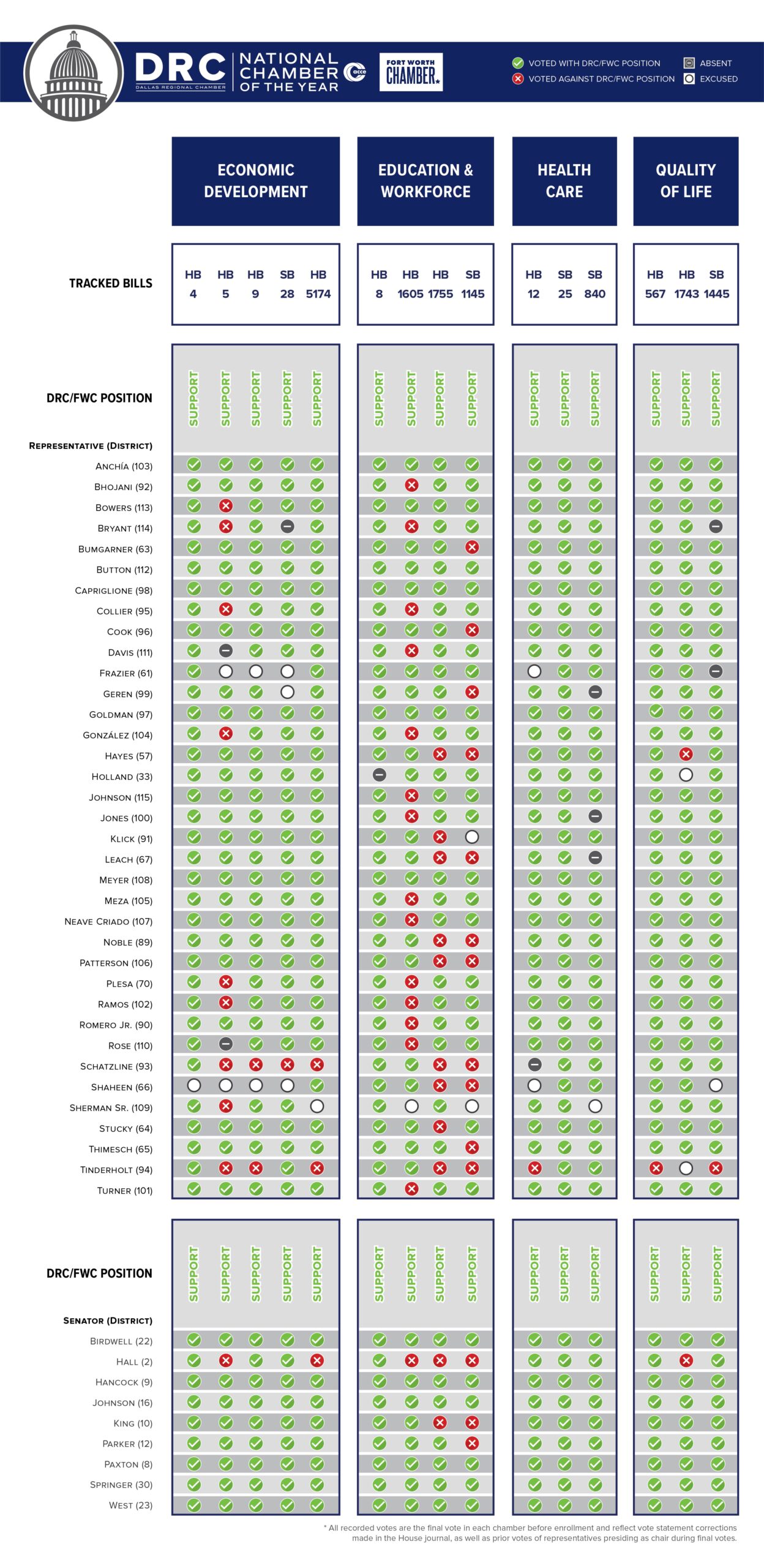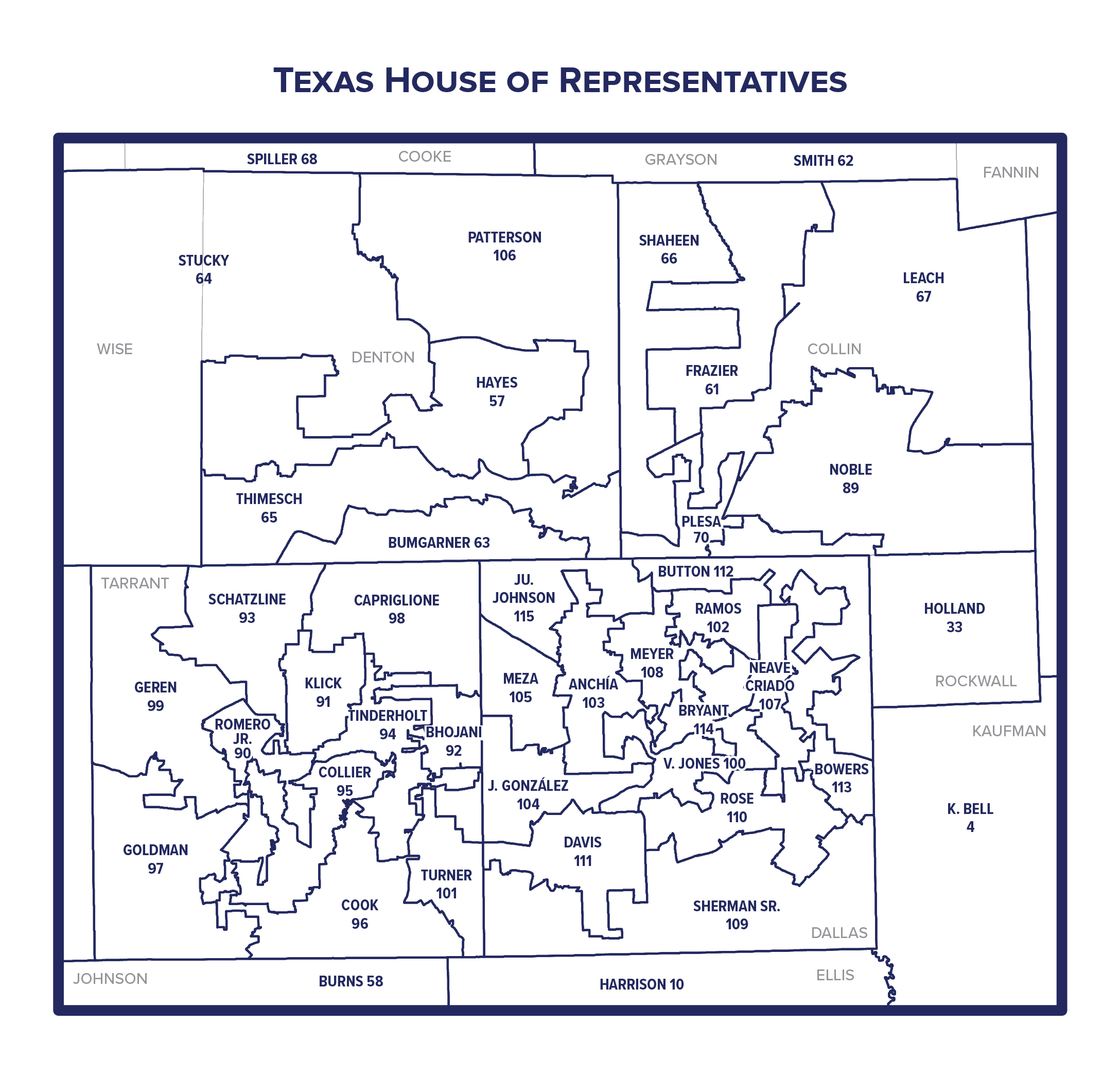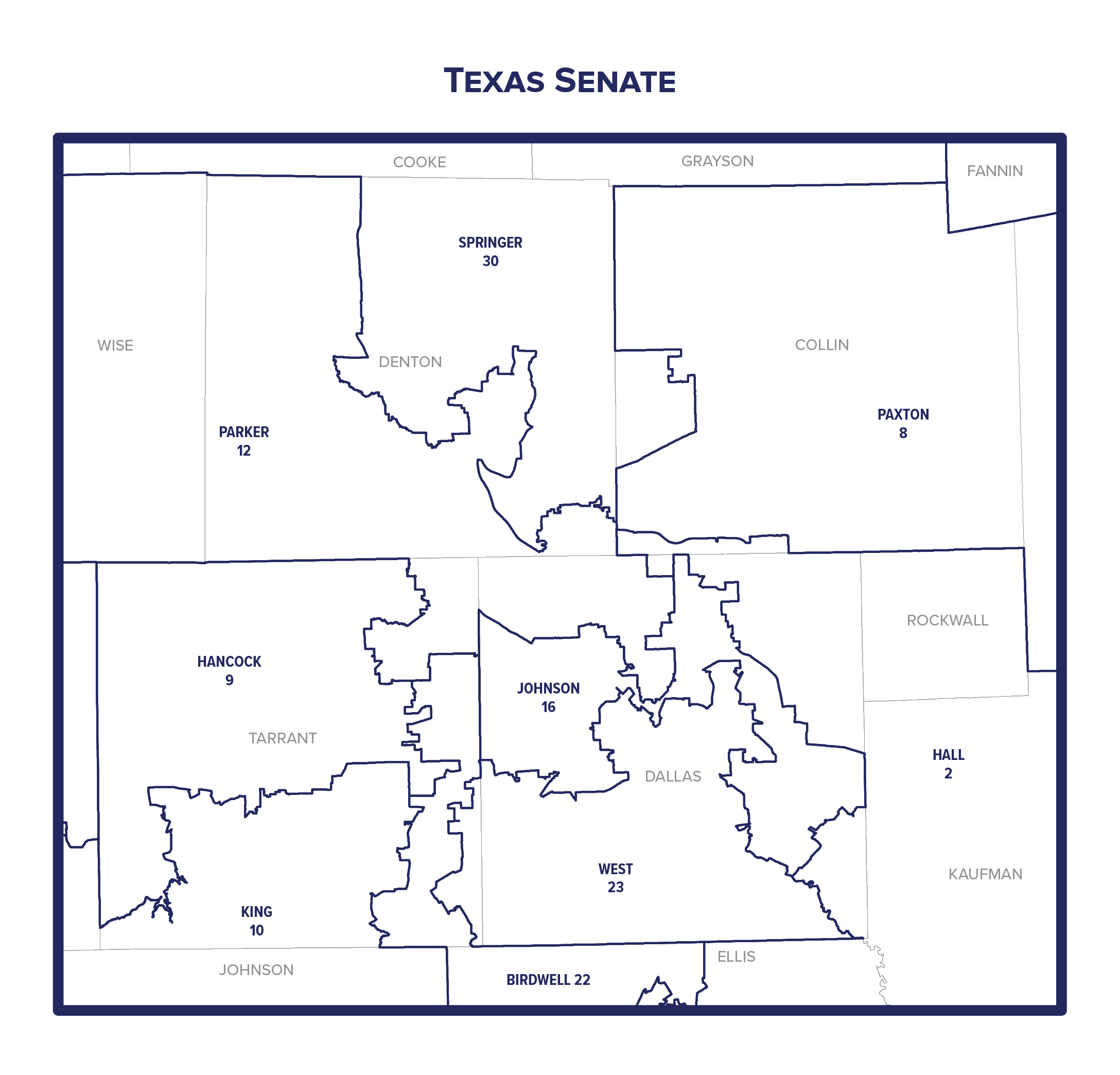
Tracking Regional Priorities in Austin
During the regular session of the 88th Texas Legislature, the Dallas Regional Chamber (DRC) and Fort Worth Chamber tracked how local legislators voted on issues that impact the region’s pro-business, pro-growth priorities.
The result is this Legislative Index, designed to help our members and the North Texas business community understand how our elected officials represented our region’s interests in Austin. The index shows the votes of 45 legislators in the Texas House and Senate on 15 bills.
Although the DRC and Fort Worth Chamber supported many pieces of legislation and opposed others, these 15 bills were chosen for their relevance to critical issues for our region and state — namely preserving Texans’ economic success, investing in Texas’ workforce, supporting a healthy talent pool, and promoting a high quality of life for all.
Texas and the Dallas Region made important progress on these issues during the legislative session that will contribute to our future resilience, competitiveness, and attractiveness as the best place in the United States to live, work, and do business.
BILL SUMMARIES
-
Economic Development
Data Privacy
-
-
- HB 4 creates a regulatory framework for the collection and use of consumer data, providing protection for Texans’ personal information and clear and consistent guidelines for businesses.
- Status: Signed by Gov. Greg Abbott June 18, 2023.
-
Economic Development Incentives
-
-
- HB 5 creates a new statewide economic development incentive program to attract major business investments across a variety of critical industries in a transparent and accountable manner.
- Status: Signed by Gov. Greg Abbott June 9, 2023.
-
Broadband Access
-
-
- HB 9 creates a broadband infrastructure fund to support a holistic approach to addressing Texas’ connectivity needs and facilitating better access to education, health care, and economic opportunity in communities across the state.
- Status: Signed by Gov. Greg Abbott June 9, 2023; effective pending voter approval of HJR 125 on November 7, 2023.
-
Semiconductor Research and Manufacturing
-
-
- HB 5174 creates the Texas Semiconductor Innovation Consortium and Texas Semiconductor Innovation Fund to help ensure Texas remains competitive in the critical sector of semiconductor research, design, and manufacturing.
- Status: Signed by Gov. Greg Abbott June 9, 2023.
-
Water Infrastructure
-
-
- SB 28 creates the Texas Water Fund and the New Water Supply for Texas Fund to allow large-scale investments in meeting Texas’ water supply and infrastructure needs, particularly as the state’s population grows.
- Status: Signed by Gov. Greg Abbott June 9, 2023; effective pending voter approval of SJR 74 on November 7, 2023.
-
-
-
Education & Workforce
Community College Funding
-
-
- HB 8 modernizes and significantly invests in Texas’ community college finance system and emphasizes outcomes-based funding to better reflect the needs and goals of colleges, job seekers, and employers.
- Status: Signed by Gov. Greg Abbott June 9, 2023.
-
Instructional Material Quality
-
-
- HB 1605 improves access to high-quality instructional materials by enabling the state to develop a free pool of rigorous, grade-appropriate resources, which will help combat teacher burnout and high rates of students learning below grade level.
- Status: Signed by Gov. Greg Abbott May 30, 2023.
-
Workforce Training
-
-
- HB 1755 creates the Lone Star Workforce of the Future Fund to provide grants to community colleges, technical colleges, and nonprofits for evidence-based workforce training programs, helping bridge credential and living wage gaps.
- Status: Signed by Gov. Greg Abbott May 27, 2023.
-
Child Care Access
-
-
- SB 1145 enables municipalities to provide property tax exemptions to licensed child care providers to help stem cost increases and decrease the likelihood of closures of a vital resource for working parents.
- Status: Signed by Gov. Greg Abbott May 29, 2023; effective pending voter approval of SJR 64 on November 7, 2023.
-
-
-
Health Care
Postpartum Health Care
-
-
- HB 12 expands postpartum Medicaid coverage in Texas to 12 months, in line with best-practice recommendations to support women and children during a vital period and to combat maternal mortality and morbidity disparities.
- Status: Signed by Gov. Greg Abbott June 18, 2023.
-
Nursing Education Supports
-
-
- SB 25 establishes grant programs to support nursing education and training to help address a critical health care labor shortage, including through scholarships and expanded loan repayment assistance.
- Status: Signed by Gov. Greg Abbott June 18, 2023.
-
Workplace Violence Penalties
-
-
- SB 840, named the Jacqueline “Jackie” Pokuaa and Katie “Annette” Flowers Act for the victims of the 2022 tragedy at Dallas Methodist Medical Center, raises the penalty for assaulting hospital personnel to a third-degree felony.
- Status: Signed by Gov. Greg Abbott May 24, 2023.
-
-
-
Quality of Life
Discrimination Protection
-
-
- HB 567 provides protection from discrimination based on hairstyles associated with race, including by prohibiting schools and employers from enforcing dress codes that discriminate against specific hair textures or protective styles.
- Status: Signed by Gov. Greg Abbott May 27, 2023.
-
Reentry Supports
-
-
- HB 1743 allows inmates to apply for Supplemental Nutritional Assistance Program benefits between 45-60 days before leaving prison, addressing a key part of the safety net for Texans reintegrating into their communities.
- Status: Signed by Gov. Greg Abbott June 12, 2023.
-
Law Enforcement Standards and Policies
-
-
- SB 1445 updates the powers and duties of the Texas Commission on Law Enforcement, including requiring the adoption of model policies on conduct and hiring and the use of licensing status and service report databases.
- Status: Signed by Gov. Greg Abbott June 18, 2023.
-
-
CONNECT WITH OUR WORK
The DRC’s advocacy efforts on behalf of the Dallas Region’s business community during the legislative session were guided by our Legislative Agenda, developed over several months of engagement with a broad cross-section of our member companies and community partners. Learn more about the DRC’s work in Public Policy and how to get involved.


